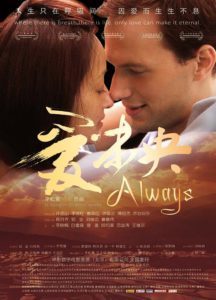Always
爱未央
China, 2013, colour, 16:9, 104 mins.
Director: Li Songlin 李松霖.
Rating: 3/10.
Clumsy pot-pourri of fantasy and romance, past and present, has only trainspotter interest.
Gejiu, Honghe prefecture, Yunnan province, southern China, the present day. Recently arrived from San Francisco, where she has a cool relationship with her widowed mother (Han Yueqiao), Chinese American photographer Pu’er (Li Qihong), while exploring her roots, meets Frenchman Lucas (Georg Anton), who is in the tin-rich region to open an exploration office for a foreign company. In the forest, by a tree long used for worship by Yi ethnic minorities, Pu’er passes out and has a vision of a young woman, Huang Deshi (Fu Shaojie), and a magical totem, the Jilu 吉祿, falling into a well. A hundred years earlier Huang Deshi had been in the same spot to attend an Yi ancestors’ ceremony, along with a Frenchman, Thomas (Nathan Boyd), whom she called her “classmate” from the US. Pu’er recovers in the same hospital as Tom (Francis Tcajegue), Lucas’ Cameroonian friend who’s been injured. There, an old woman thinks Pu’er is her missing granddaughter. A hundred years earlier, several parties, including the French, were after the tin in Laoyin mountain, a site protected by the Yi. To beat the French, the locals, led by Huang Deshi’s father Huang Bo (Tang Zhenzong), planned to smuggle away the Jilu, without whose power no one could control Laoyin mountain. Widowed guesthouse owner Yueshuang (Guo Jin) also teamed with businessman Zhu Jinyuan (Liu Jizhong), a tin magnate, to exploit the mountain for themselves. Meanwhile, in the present day, Pu’er is shocked to discover that Lucas’ company has bought the Jilu at auction in San Francisco in order to gain control of the mountain. She sees history repeating itself with foreign exploitation. A hundred years earlier, the emperor had ordered Huang Bo to let a Japanese businessman, Iwasa Kosan (Li Xiaofeng), exploit the mountain’s tin reserves. As a result, Huang Bo told his daughter Huang Deshi to marry Thomas and escape with the Jilu.
REVIEW
An object lesson in how not to make a Chinese film appeal to everyone, Always 爱未央 throws the present and the past, the Mainland and the US, Mandarin and English dialogue, reality and fantasy, ethnic minorities and Han Chinese, plus fantasy, romance and an international cast from China, Hong Kong, Taiwan, the US, Austria and Cameroon into a big pot and stirs over a slow fire for 100 or so minutes. The resulting farrago, which barely makes sense even with (or because of) four scriptwriters, may appeal to Hui Yinghong 惠英红 [Kara Hui] completists but even they will be disappointed to find the Hong Kong actress, quite subdued here, actually has a relatively small role. The only people to emerge with much credit are d.p. Wang Shiqing 汪士卿, whose photography of southern Yunnan is clean and good-looking, and composer Liu Ye 刘晔, whose smooth score wraps the whole thing in a warm cocoon.
Director Li Songlin 李松霖 (from Yunnan province’s Hani minority) and lead writer Fu Shaojie 傅绍杰 previously collaborated on the vignettish but quietly entertaining kids’ movie The First Light 俄玛之子 (2008), in which Fu, an actress in her own right (Little Red Flowers 看上去很美, 2006), played a cute teacher. In Always she takes a smaller role, appearing in flashbacks 100 years ago as the doomed young woman whom the main female character keeps getting visions of. Fu is OK, and has put herself in the film’s marginally more interesting half – which is more than can be said for Hong Kong-born, Canada-raised Li Qihong 李绮虹 (Big Bullet 冲锋队怒火街头, 1996; When I Fall in Love…with Both 月亮的秘密, 2000; Christmas Rose 圣诞玫瑰, 2013) who has some painful English dialogue to negotiate and not much of a role as a Chinese American photographer in search of her roots. Other roles by a largely older cast are played solidy enough within the limits allowed them, with Taiwan’s Tang Zhenzong 汤镇宗 bringing some authority to the goings-on as the local high-up. But the movie’s two halves hardly knit together in a comprehensible fashion and the underlying theme of China being exploited by western businessmen is clumsily flagged throughout.
The film was shot in the summer of 2011 in Yunnan province, and was known during production as New Red River Valley 新红河谷, referring to the prefecture (Honghe, “red river”) in which it’s set. The finished film’s Chinese title is a phrase signifying total, unending love.
CREDITS
Presented by Kunming Ema Culture Communication (CN). Produced by China Film Association (CN), Honghe State People’s Government (CN), CPC Honghe State Publicity Department (CN), Kunming Ema Culture Communication (CN), Shanghai Wang Ziqi Culture Communication (CN).
Script: Fu Shaojie, Li Songlin, Wan Qiaoshu, Yang Yongan. Photography: Wang Shiqing. Editing: Jiang Tianzeng, Zhang Bingsu. Music: Liu Ye. Art direction: Li Yongping. Costume design: Chen Li, Liu Zhengfu. Sound: Chen Chao, Ni Xiaoniu, Qiao Peiyuan. Visual effects: Li Songlin. Artistic advice: Li Qiankuan. Executive direction: He Yingmin.
Cast: Xu Huanshan (Bai Shuiyuan), Li Qihong (Pu’er/Pure), Tang Zhenzong (Huang Bo), Hui Yinghong [Kara Hui] (Bai Shancha), Fu Shaojie (Huang Deshi, Huang Bo’s daughter), Georg Anton (Lucas), Nathan Boyd (Thomas), Duan Junhao (Huasheng, Huang Deshi’s childhood friend), Guo Jin (Yueshuang, guesthouse owner), Han Yueqiao (Pu’er’s mother), Xia Jiawei (Xia), Liu Jizhong (Zhu Jinyuan, tin-mine boss), Li Xiaofeng (Iwasa Kosan), Wang Jizong (Niu, caravan master), Fan Jintao (Zhu Yimao, Jinyuan’s son), Francis Tcajegue (Tom), Zhou Huchang (Zhao Zhangfa), Shi Youfu (Bi Mo), Wu Huahao (Zhang Wen), Li Xinyi (Cao’er, Yueshuang’s daughter), Zhu Lanying (old village woman).
Premiere: Beijing College Student Film Festival (Chinese Film Competition), 15 Apr 2013.
Release: China, 11 Jul 2014.
(Review originally published on Film Business Asia, 22 Dec 2013.)
